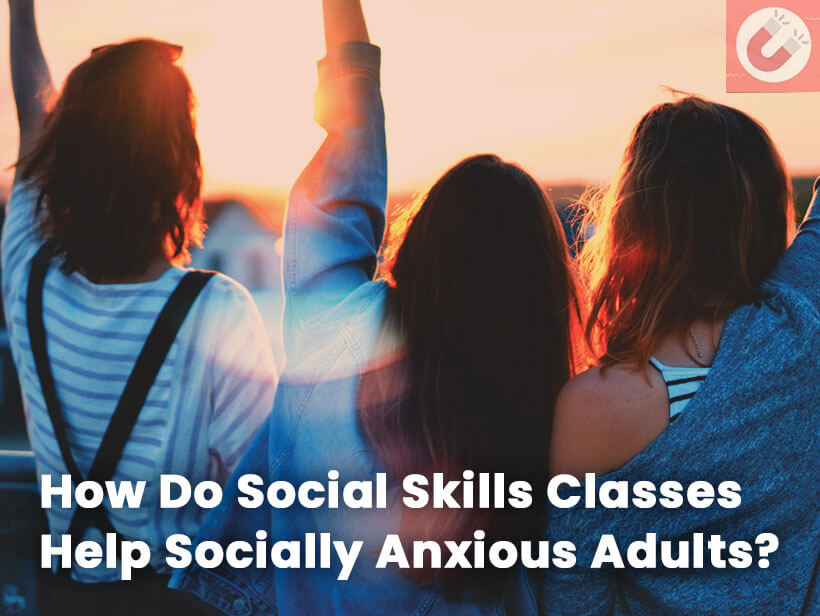Have you ever felt like people are hesitant to approach you or engage in conversation, or do you find it’s hard to build rapport with new people? Do you struggle to connect with others in social or professional settings?
Whether you’re trying to make new friends, get better at flirting, or establish stronger professional relationships in the workplace being approachable is a key factor in successful interactions.
Fortunately, approachability is a skill that can be developed with practice and awareness.
In this article, we’ll explore effective strategies for enhancing your approachability and creating positive connections with others. From understanding the impact of body language to improving communication skills, we’ll provide actionable tips to help you become more approachable and build meaningful relationships.
Why is being approachable so important?
Being more approachable can have many benefits for both your personal life and professional career. Improved relationships with others can lead to deeper connections, which in turn can help foster a sense of belonging in social settings. Having increased opportunities for socialization allows you to build important networks that can help you grow both professionally and personally. Finally, improved work performance and career prospects come from being viewed as someone friendly, welcoming, and open to collaboration.
Being socially awkward can make it hard to navigate social situations, leading to feelings of isolation and limited success in achieving your personal and professional goals.
And it can really hurt your chances if you’re trying to boost your flirting game.
Fortunately, there are steps you can take to become more approachable so that you can improve your relationships with others, increase opportunities for socialization, and boost your work performance.
In this article, we’ll discuss what it means to be approachable, the benefits associated with it, how you can become more open and welcoming to others around you, and how to overcome any barriers that may be preventing you from doing so.
How to be more approachable
With the right mix of social skills, anyone can become more approachable and start to form meaningful connections with others by following these steps.
1. Smile and make eye contact
Smiling and making eye contact are two of the easiest ways to make yourself more approachable. Smiling shows that you are friendly and open to engaging with others. It can quickly convey a sense of warmth and encourage positive interactions.
Making eye contact also communicates openness and shows that you are paying attention to them. For adults on the autism spectrum, it may take practice to make eye contact, but it can be an important step in developing meaningful relationships with others. If you’re having difficulty, start by making eye contact with a single person in the group or focusing on one point of reference.
2. Use open body language
Open body language conveys a message of openness and willingness to talk. Uncrossing your arms and leaning forward are two gestures that convey an atmosphere of acceptance and comfort. Some of the other body language cues that you can use to become more inviting include:
- Keeping your posture open
- Not turning away from the conversation
- Nodding or making affirmative gestures
3. Practice active listening
Active listening involves paying attention and asking relevant questions when appropriate. This shows that you are interested in engaging in meaningful conversations. It also gives others a chance to be heard and gives them a sense of importance. Some tips for getting better at active listening include:
- Focusing on the conversation
- Summarizing what the other person has said
- Asking questions to clarify understanding
4. Make yourself available
Making yourself available communicates that you are interested in engaging in conversations with others. This can be done through simple gestures such as scheduling meetings or coffee dates to get to know people better, participating in social activities and events that bring people together, or by joining clubs and organizations in your area.
This can be much easier said than done for busy adults, but it’s important to remember that even small conversations can help you build meaningful relationships and give you a better idea of how to connect with other people.
5. Show empathy
Showing empathy allows the other person to feel heard and understood, which can help build stronger relationships over time. This involves being able to listen without judgment and understanding how the other person is feeling at any given moment. It also requires being able to put yourself in their shoes before responding or offering advice.
By understanding how the other person is feeling, you can better tailor your response to how they are feeling and help create a more meaningful connection.
6. Ask questions and show interest in others
When you start conversations with people, it’s important to ask questions and show an interest in their life. Asking open-ended questions can help the other person feel comfortable, and it allows you to learn more about how they think. Showing genuine interest in people you interact with can give them a sense that you care about what they have to say, and it can help create stronger relationships over time.
Asking the right questions at the right time is one of the best ways to become more approachable, and it can be a great way to start conversations with people and learn how to connect on a deeper level.
7. Be authentic and genuine
Authenticity is key when it comes to having meaningful conversations with others. Being genuine and honest helps show others that you are a real person who can be trusted. It also gives people a sense of how you truly feel and think, which can help build relationships with others.
When engaging in conversations with others, be sure, to be honest, and open about how you feel at any given moment. This can help create a more meaningful connection and give them a sense of how you think.
With new groups of people, you may feel intimidated or anxious at first when you don’t know where someone else stands on a topic, how they might react to your thoughts, or how they will judge you can be a challenge. It is important, though, to practice being honest and authentic to build meaningful relationships.
8. Show appreciation and gratitude
Showing appreciation and gratitude can go a long way in helping you create meaningful relationships with others. People like to feel appreciated. This can be done by saying thank you or expressing how much you value someone’s time, effort, or advice. You can also show appreciation through small gestures such as sending a thank-you card or inviting someone out for lunch.
Showing appreciation can help you create meaningful and lasting relationships with people, and it can help them feel appreciated and valued. This is a big weak spot for many otherwise great leaders, so don’t forget to show how much you appreciate the people in your life if you want to be more approachable.
9. Avoid interrupting or dominating conversations
This should go without saying, but it’s important to avoid interrupting or dominating conversations when trying to be more approachable. Interrupting someone shows that you don’t respect their opinion or how they feel. It also makes it difficult to build meaningful relationships with them, as it can make the other person feel unheard or disrespected.
When engaging in conversations, it’s important to allow the other person to finish their thought before offering your own opinion. This can help you create a more meaningful connection, as it shows that you are listening and trying to understand how they feel.
If you find yourself constantly interjecting in conversations, take a step back and allow the other person to finish their thought before responding. You can even apologize for interrupting if you find someone has become a little reluctant to engage in conversations with you.
What makes someone seem unapproachable?
Becoming more approachable is a process, but it can be done with practice. By being mindful of how you interact with others and how you present yourself, you can make a positive impact on how people perceive you. It’s important to remember that how someone else views you is out of your control, but how you present yourself is something that can be changed. Knowing how to use humor in conversation can be really helpful here, as well.
Some of us may need to do a little soul-searching to figure out exactly what is holding us back from being more approachable. At Jaunty, we’ve seen it all. Here are some of the most common barriers to approachability we come across, and a few tips to overcome them.
Anxiety
If you are feeling overwhelmed or anxious about social interactions, it’s important to take a step back and remember that how someone else reacts is out of your control. Taking deep breaths or engaging in mindful activities like meditation or yoga can help you feel more relaxed and less anxious in social situations.
Lack of confidence
Having low self-confidence can be a barrier to becoming more approachable. If you feel like you are lacking in confidence, it’s important to remember that how someone else views you is out of your control, but how you present yourself is something that can be changed. Working on building up your self-confidence through positive affirmations and positive self-talk can help you become more confident in how you present yourself to others.
Fear of rejection
If you are afraid of being rejected, it can be difficult to become more approachable. It’s important to remember that how someone else responds to you is out of your control, but how you present yourself can be changed. Pushing through the fear and engaging in conversations with people, even if it’s outside of your comfort zone, can help you become more approachable and make a positive impact on how people view you.
Lack of self-awareness
If you are unaware of how your actions and words make people feel, it can be difficult to become more approachable. It’s important to become mindful of how you interact with people and how your words or actions make them feel. Taking a step back to observe how others react to you can be a good way to become more aware of how you present yourself.
Negative body language
Having negative body language can be a barrier to becoming more approachable. It’s important to be aware of how your body is positioned when you talk to people. Making sure you are standing up straight and making eye contact can help you make a positive impression on how people view you. When you make a positive impression on how people view you, it can help them to be more open and receptive to engaging in conversations with you.
Passive listening
Making others feel listened to may be the most important step in becoming more approachable. Passive listening is the opposite of active listening, where instead of engaging in conversations with people, you are only half-listening. If you find yourself being passive in conversations, it’s important to become more mindful of how you are engaging with people.
If you are not a good active listener, it can become difficult for people to figure out how to engage in conversations with you. Showing others that you’re listening takes practice, but here are a few tips to help you get started.
- Make eye contact and pay attention to what is being said.
- Ask questions about the conversation topic to show that you’re interested in what the other person is saying.
- Don’t interrupt and make sure to give the other person time to express their thoughts.
- Show that you’re listening by nodding, smiling, and providing verbal feedback.
- Make sure to summarize what the other person has said at the end of the conversation to show that you were listening.
- Utilize active listening techniques, such as repeating back what the other person has said.
- Remember that how you present yourself and how your actions make people feel is something you can always work on.
Unconscious bias
Having unconscious bias can be a major barrier to becoming more approachable. It’s important to become aware of how your perceptions and beliefs may unconsciously influence how you interact with others. Working on becoming more mindful of how your own beliefs may be influencing how people perceive you can help to make you more approachable.
It takes a lot of work to uncover and unlearn preconceived notions the that we have built up over the years, but it is important to become aware of how they might be impacting how people see us. If you want to become more approachable, it is important to do the work to become conscious of how your biases might be influencing how people view you.
Negative past experiences
If you’ve had bad experiences in the past that have impacted how you view social interactions, it can be difficult to move beyond them. It’s important to remember that how someone else reacts to a situation is out of your control. The best thing you can do is focus on how you present yourself and how your actions make people feel.
Become more approachable, win friends, and influence people
Anyone can become more approachable with a little effort and practice, and being seen as more approachable can be beneficial for both a wide array of personal friendships, romantic interests, and professional goals.
Be aware of how your words and actions make people feel, how you present yourself, and how your unconscious biases may be influencing how people perceive you.
Taking the time to reflect on your interactions with other people and becoming mindful of how you converse with others can help you to become more approachable. With a little bit of effort, anyone can make strides in how others perceive them.
How Jaunty Social Skills Training Services Work
We’ve made the process of mastering social skills simple.
Here’s how to get started with us:
- Step 1: Complete our form to let us know your needs.
- Step 2: If we’re a good fit for each other, you can set up a call to discuss our service and pricing with you.
- Step 3: We have two services, and they can work together: The Six-Week Masterclass and The Jaunty Gym.
If you’ve been wanting to improve your social skills but haven’t had the time to commit, or have had bad experiences in the past, fill out our form to learn more about your options. Regardless of where you are socially we have found that anyone can improve their social skills and their social life. You can try it out for a month or two and see how you like it. For testimonials from our clients, check out our success stories.



